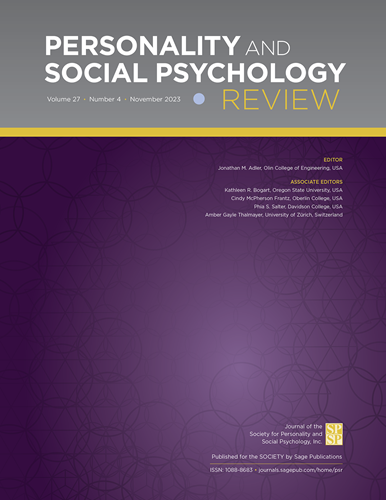去歧视化研究如何帮助减少歧视?
IF 10.4
1区 心理学
Q1 PSYCHOLOGY, SOCIAL
引用次数: 0
摘要
学术摘要 了解和减少群体间歧视是心理学研究的前沿问题。然而,寻找灵活、可扩展和持久的干预措施来减少歧视的努力只取得了喜忧参半的结果。在这篇综述中,我们强调了开发解决歧视问题的新策略的一个潜在途径:调整先前关于去偏差的研究--减少判断错误中的偏差(如动机推理、过度自信和锚定启发式)的过程。我们首先介绍一种分类法,以了解去偏差文献中常见的干预策略,然后重点介绍已被证明能成功减少群体间歧视的现有方法。最后,我们提请大家注意那些尚未应用于歧视问题的、有前景的消除歧视干预措施。Public Abstract研究群体间偏见的科学家通常关注减少歧视(一个社会群体相对于另一个社会群体的不平等待遇),但许多减少此类偏见行为的干预措施证据不足或有限。在这篇综述文章中,我们认为减少歧视的一个有效途径来自于对一个独立领域--判断和决策--的干预措施进行调整,该领域历来研究 "去偏差":人们如何减少无关信息对决策的不良影响。尽管去中心化研究与减少群体间歧视的研究有一些共同之处,但许多去中心化干预措施所依赖的方法与群体间偏见文献中所使用的方法不同。我们回顾了一些成功应用去中心化原则来减少群体间行为偏见的实例,并介绍了其他可能非常适合未来减少歧视工作的去中心化技术。本文章由计算机程序翻译,如有差异,请以英文原文为准。
How Can Debiasing Research Aid Efforts to Reduce Discrimination?
Academic AbstractUnderstanding and reducing intergroup discrimination is at the forefront of psychological research. However, efforts to find flexible, scalable, and durable interventions to reduce discrimination have produced only mixed results. In this review, we highlight one potential avenue for developing new strategies for addressing discrimination: adapting prior research on debiasing—the process of lessening bias in judgment errors (e.g., motivated reasoning, overconfidence, and the anchoring heuristic). We first introduce a taxonomy for understanding intervention strategies that are common in the debiasing literature, then highlight existing approaches that have already proven successful for decreasing intergroup discrimination. Finally, we draw attention to promising debiasing interventions that have not yet been applied to the context of discrimination. A greater understanding of prior efforts to mitigate judgment biases more generally can expand efforts to reduce discrimination.Public AbstractScientists studying intergroup biases are often concerned with lessening discrimination (unequal treatment of one social group versus another), but many interventions for reducing such biased behavior have weak or limited evidence. In this review article, we argue one productive avenue for reducing discrimination comes from adapting interventions in a separate field—judgment and decision-making—that has historically studied “debiasing”: the ways people can lessen the unwanted influence of irrelevant information on decision-making. While debiasing research shares several commonalities with research on reducing intergroup discrimination, many debiasing interventions have relied on methods that differ from those deployed in the intergroup bias literature. We review several instances where debiasing principles have been successfully applied toward reducing intergroup biases in behavior and introduce other debiasing techniques that may be well-suited for future efforts in lessening discrimination.
求助全文
通过发布文献求助,成功后即可免费获取论文全文。
去求助
来源期刊

Personality and Social Psychology Review
PSYCHOLOGY, SOCIAL-
CiteScore
19.00
自引率
1.90%
发文量
20
期刊介绍:
Title: Personality and Social Psychology Review (PSPR)
Journal Overview:
Official journal of SPSP, the Society for Personality and Social Psychology, Inc.
Premiere outlet for original theoretical papers and conceptual review articles in all areas of personality and social psychology
Features stimulating conceptual pieces identifying new research directions and comprehensive review papers providing integrative frameworks for existing theory and research programs
Topics Covered:
Attitudes and Social Cognition: Examines the inner workings of the human mind in understanding, evaluating, and responding to the social environment
Interpersonal and Group Processes: Explores patterns of interaction and interdependence characterizing everyday human functioning
Intergroup Relations: Investigates determinants of prejudice, conflict, cooperation, and harmonious relationships between social groups
Personality and Individual Differences: Focuses on causes, assessment, structures, and processes giving rise to human variation
Biological and Cultural Influences: Studies the biological and cultural mediation of social psychological and personality processes
 求助内容:
求助内容: 应助结果提醒方式:
应助结果提醒方式:


